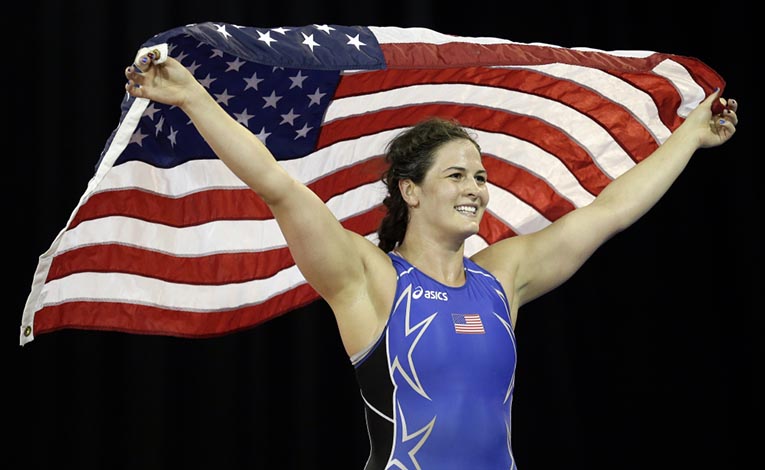Just last year, wrestler Adeline Gray won the world championship, the Pan American Games, the U.S. World Team Trials, the U.S. Open and the World Cup and is a semifinalist for the Sullivan Award. She did not lose a match all year.
In a wrestling career that began at age 6 with the urging of her dad, Gray has done virtually everything except the one thing no American women has done: Win an Olympic wrestling gold medal.
An alternate in 2012, Gray has her eyes squarely on Rio and she has become the face of women’s wrestling.
As part of USA TODAY High School Sports’ ongoing coverage of Girls Sports Month, Gray, 25, talked about how wrestling changed her life, the importance of dreaming big and her desire to bring home gold.
This week is also Women’s Wrestling Week, a program through USA Wrestling that celebrates women’s wrestling history. USA Wrestling is offering free membership during the week so girls and women can try the sport. The initiative is using the hashtags #eachonebringone and #girlswrestle. You can follow Gray on Twitter @AdelineGray and on Instagram @adelinegray12
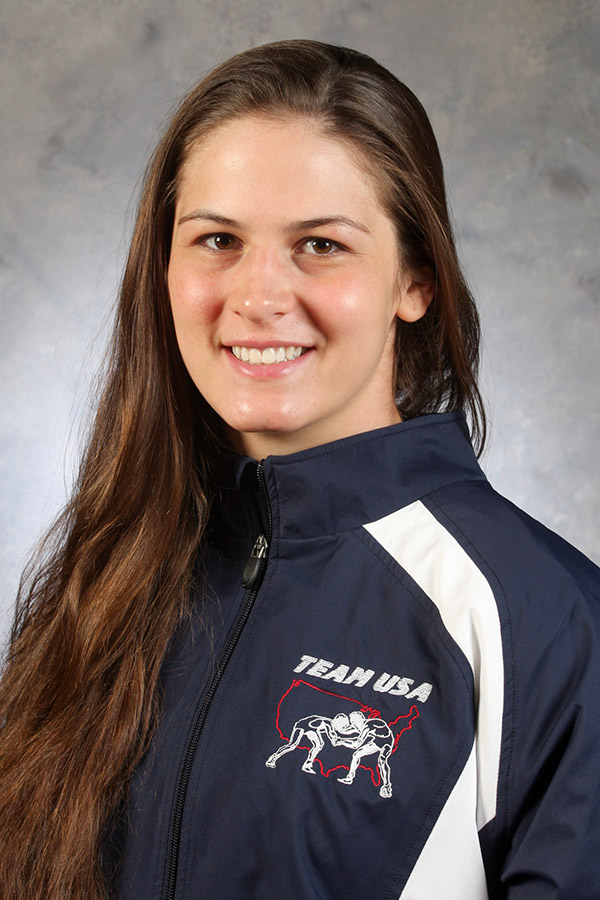
What is it about wrestling that spoke to you?
Adeline: When I was a kid, soccer was my No. 1 sport and wrestling was No. 2. Wrestling was fun and something I did, but I never called myself a wrestler. That changed in middle school and early in high school when I saw the opportunities in women’s wrestling and I phased out of team sports. I saw that I could get my education paid for and I just graduated debt free thanks to wrestling and I had the opportunity to travel on national teams and Olympic teams and world teams and meet so many amazing people.
I got the opportunity to really find my voice in wrestling. Women’s dreams are so important in athletics and can bring women up to an equality standard that women are striving for politically and in so many other areas of life. USA Wrestling has given me an awesome platform and I’m so honored to be enjoying the process of becoming an elite athlete and that happened from choosing a non-mainstream sports like wrestling.
What advice would you give to young girls who want to be wrestlers?
Adeline: They need to know that it’s a lot closer than they think it is. It might feel far away when you see see people with a lot of skills or sponsors or endorsements. It feels like pro athletes are so out of reach. With a little bit of hard work, they can get to this level before they realize it. I didn’t realize it when I was climbing the ranks. I saw myself as just a high school girl climbing the ranks. This sport has some social mobility. You have the ability to go from a basic level to being able to travel the world and get your education funded with talent and hard work. That was enough to take me to this amazing life that I’m living.
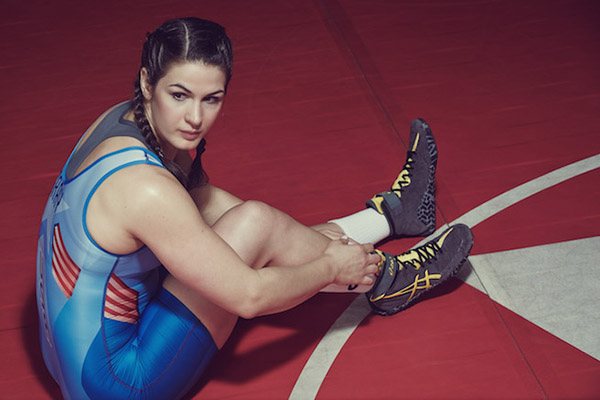
In high school, you were the captain of the team – a team of boys. What was that experience like?
Adeline: I went to Bear Creek High School in Colorado and then transferred to Chatfield. I was the captain at Chatfield. At Bear Creek, my uncle was an assistant coach and ran the junior level team and my cousin had been on the team. The boys weren’t worried about me being on the mat. They had girls on the team before and knew the rules. They understood we were athletes and there weren’t too many problems. At Chatfield, the coach was uneasy about having girls in the room. The boys didn’t understand I was a serious athlete and there to train. I put my head down as a sophomore and earned their respect. I had 10 years of wrestling experience at that point and I was able to help the other kids get better. I carried myself as a serious athlete and ended up being captain.
I’m very grateful that the boys in some ways swallowed their pride and give me a captain spot. That might be looked down on in some areas. Those boys are going to be better for it because they might go into the real world and have a woman as their boss. It taught me a lot about having control and having respect in my corner and it helped the entire team. It was a reflection of the reality of life. Boys and girls compete in life at every level in jobs from working at McDonald’s all the way up to being the CEO of a Fortune 500 company. Our wrestling room reflected what a lot of our male dominated businesses look like in this country.”
When was the point where you got the confidence and you could say, ‘Hey, I’m really good at this’?
Adeline: When I made the junior worlds team, there were girls on the team who had been there before and had had success. I wasn’t as confident because I had never really excelled because I was pretty new to freestyle wrestling as a high school junior. It was a different type of transition. When I ended up winning junior worlds in 2008, it was like this light bulb went off. I said to my coaches. “Hey, what happened?” I won and was like, ‘So?’ The coaches said, ‘People don’t just win this tournament.’ I came back next year and was like, ‘What can I do now?’ I tried out for the senior worlds team in 2009 and made fifth that year and then the next year I took third. I’ve gone on to make six world teams, three gold medals and two bronze medals and the Olympics and I’m hoping to become the first American woman to win an Olympic gold medal in wrestling. It’s just been an awesome opportunity that I’ve been allowed to explore.
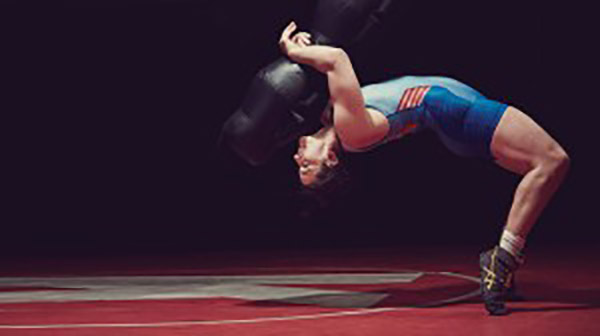
You were an alternate in the 2012 Olympics and had to lose quite a bit of weight because the Olympics only had four weight classes. What did being there and the experience of not competing teach you?
Adeline: I think it’s staying focused on my goals and what I can accomplish and what I can control. I didn’t get the opportunity to train in my weight division in 2012. I dropped 30 pounds to make the lower weight class, which is confusing because I never competed at the higher weight class. The struggle solidified the fact that these girls at the Olympics are not better than me. I put myself in position to win. I go out and wrestle and compete with these girls. That’s what I do, I compete. My weight division got put in for 2016. There were four weights in 2012, but they were looking for more women’s weight classes so it went to six weights in 2016. I’ll be able to compete in my weight division. All I can say is, It’s going to be my mat that day.
You have become to many the face of women’s wrestling. What does that distinction mean?
Adeline: I’m honored to step into that position. I don’t think it’s a role that everyone wants to take on. There is a responsibility and expectation to take on with it. It’s necessary with our sport right now. We are no longer at the point where we are begging for people to accept us. We need to let some of the bigger sponsors know it’s OK to sponsor bigger-name women who are feminine and beautiful athletes. Those are the qualities the National team portrays on a regular basis and this is a time to take that on to a broader stage, to be vocal about it to younger girls and grow the next group of athletes.
It’s a pretty awesome opportunity. I keep saying that I need to find a thesaurus to find a new word. I couldn’t ask for anything more in terms of what’s available to me and what I can get my fingertips on.
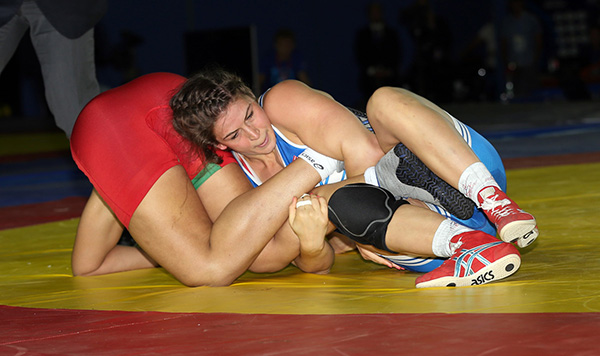
You are in a sport that goes by weight classes. With many young women having body image issues, is the definition of beauty changing?
Adeline: I think all girls go through body image issues. There’s a stigma that girls to be pretty need to be petite. That’s changing with strength being looked at as beauty and power being looked at as something to honor. If you go in and put in the work and have a more muscular boy, people realize that means health. Girls need to see beauty as more than am I skinny or am I fat. They can describe themselves as powerful and beautiful in the same sentence. Those are both words to describe female athletes. I’m a 175-pound female. I am considered a super heavyweight by international wrestling standards, but not by U.S. standards. It’s a different image of how you fit in and you develop self confidence. Sports can teach you that.
If there is one thing you could say to girls and women who play sports today, what would it be?
Adeline: I would tell them to dream bigger than they have. The perception is in our society that boys are not just better off in sports but in life. They have pro athletes to look up to. There are people in our faces all the time with the NBA, NFL and all the pro leagues who are living extravagant lives that people envy.
Those dreams and opportunities aren’t there for females. When I went into high school, I didn’t think I’d do anything beyond four years of college soccer and be done with my athletic career and that was good enough. I now realize there is so much more that I can accomplish with my body, my athletic ability and with my goals. I hope girls can think of those things and see great lives.
There’s been an amazing transition from when I was in a freshman in high school to where it is now. And I’m not done yet. I’ve got an Olympic gold medal to win. It’s an amazing thing to be able to have that dream.
There’s millions of boys who look up to NFL players and have that dream and get closer to it but never make it. Some boys might not make the NFL but they spend hours of practicing and keeping their grades up because they have that dream. Girls who don’t have something to drive them on a daily basis miss out on a lot of the potential that exists in young females athletically and academically. They don’t have anything to push them like a dream.
Courtesy of: USA Today High School Sports
